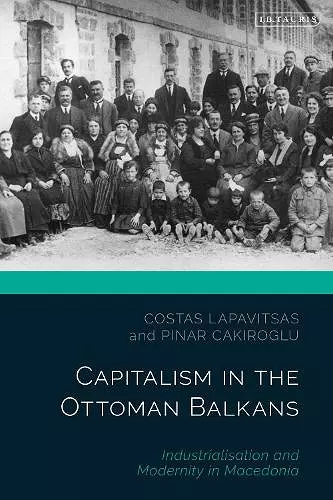Capitalism in the Ottoman Balkans
Industrialisation and Modernity in Macedonia
Costas Lapavitsas author Pinar Cakiroglu author
Format:Paperback
Publisher:Bloomsbury Publishing PLC
Published:20th May '21
Currently unavailable, and unfortunately no date known when it will be back

An in-depth study offering a new perspective on the economic and political development and trajectory of the late Ottoman Empire
The Ottoman Empire went through rapid economic and social development in the late nineteenth and early twentieth centuries, as it approached its end. Profound changes took place in its European territories, particularly and prominently in Macedonia. In the decades before the First World War, industrial capitalism began to emerge in Ottoman Macedonia and its impact was felt across society.
The port city of Salonica was at the epicentre of this transformation, led by its Jewish community. But the most remarkable site of development was found deep in provincial Macedonia, where industrial capitalism sprang from domestic sources in spite of unfavourable conditions. Ottoman Greek traders and industrialists from the region of Mount Vermion helped shape the economic trajectory of ‘Turkey in Europe’, and competed successfully against Jewish capitalists from Salonica.
The story of Ottoman Macedonian capitalism was nearly forgotten in the century that followed the demise of the Empire. This book pieces it together by unearthing Ottoman archival materials combined with Greek sources and field research. It offers a fresh perspective on late Ottoman economic history and will be an invaluable resource for scholars of Ottoman, Greek and Turkish history.
Published in Association with the British Institute at Ankara
Finally, a specific tale is told to complement the general history of Ottoman industrialization and economic development in the nineteenth century. Lapavitzas and Cakiroglu bring earlier theoretical debates on the transition to capitalism back in and blend them with extensive empirical evidence from distinct sources to shed light on the experience of a region in its path to capitalist development. Naoussa stands out as a centre of Ottoman industrial capitalism with the dynamic participation of local families in textile manufacturing and commercial activity throughout this period. This small town and its surrounding region, namely, Mount Vermion, encapsulate prime features of Ottoman modernization, namely, Tanzimat, and demonstrate at its best the characteristics of late Ottoman capitalism. Although “the region amounted to little more than a small pocket of industrial capitalism,” the authors argue, its experience offers some fresh insights into the study of Ottoman economic history and European economic development in the age of the Industrial Revolution. * Onur Yildirim, Professor, Department of Economics, Middle East Technical University, Turkey *
The study is an important contribution to the debate on industrialisation in the late Ottoman Empire. It focuses on the as yet almost totally neglected south-western Macedonian case, pointing out the internal social dynamics of urban and rural economic transformation, but also the powerful constraints under which industialisation occurred. The research is also original in that it demonstrates the decisive impact of political and institutional factors on regional economic development. It shows, on the one hand, how the Ottoman administration strove to face the challenges of European industrial and geopolitical competition by providing incentives to industrialists, only to falter under the growing pressure of ethnic and cultural antagonisms; and on the other, it demonstrates how the investments and entrepreneurial decisions of the dominant Greek Orthodox and Jewish industrialists were supported and greatly facilitated by local communal structures, in which they were securely and advantageously embedded. It is a must-read book for those interested in the economic and social history of Southeastern Europe and the Eastern Mediterranean during the surge of the first Globalisation. * Socrates D. Petmezas, Professor of Modern Economic and Social History at the University of Crete *
In this interesting and well written book, Lapavitsas and Cakiroglu tell the unlikely story of the emergence of industrial capitalism in Ottoman Macedonia during the decades before World War I. They show how, despite the conditions of free trade, Jewish and Greek entrepreneurs made use of the existing natural resources as well as state policies to create a large industrial base in cotton spinning and wool weaving. It was not easy, however, to sustain this effort in an environment dominated by mostly small scale agriculture and in the age of rising nationalisms. There are important lessons in this insightful account also for those interested in the theoretical aspects of the rise of industrial capitalism. * Sevket Pamuk, Bogaziçi University, Istanbul *
ISBN: 9780755642779
Dimensions: 234mm x 154mm x 16mm
Weight: 480g
312 pages